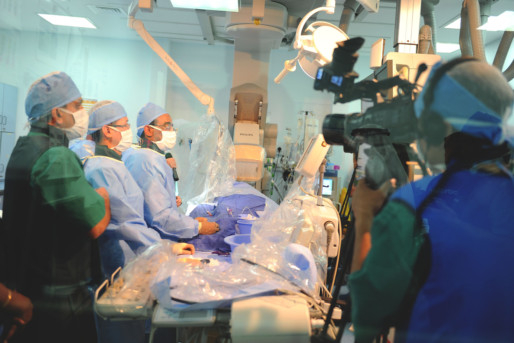
Dubai: The UAE is the only country from the region and the third in the world outside Europe to have the honour of live surgical broadcasts at the Euro PCR, the official Congress for the European Association of Percutaneous Cardiovascular Interventions being held in France, on Thursday.
Dr Fahd Baslaib, consultant interventional cardiologists and director of the Cardiology Department at Rashid Hospital, Dubai, told Gulf News: “It is indeed an honour to be chosen to represent UAE at the gathering of such eminent cardiologists from around the world.”
Dr Baslaib conducted three back-to-back heart surgeries from 9.30 am to 6 pm on April 19 at the Rashid Hospital and the operations were streamed live to the gathering.
Elaborating on the procedures, he said: “I conducted a cardiovascular catherisation, an angioplasty and a stent implantation among other things. The first patient was a 30-year old young man of South Asian origin who had a history of diabetes, hypertension and came to us when he suffered a heart attack. An angioplasty was carried out immediately to clear the blockage in one of the major arteries. During this live surgery that we conducted after he had convalesced from the previous surgery, we operated on his two major arteries that also had considerable narrowing down.”
Dr Baslaib said he used the Fractional Flow Reserve (FFR), a special guide-wire-based technology to unblock the other two arteries and implant two biabsorbable stents.
The second live surgery was conducted upon a 60-year old man who had experienced a heart attack that had necessitated an emergency stent procedure. The live surgery was performed after the patient had recovered from the pervious procedure. Dr Baslaib conducted the surgery using a highly specialised imaging technique called the Optical Coherence Tomography, a fibre optics guided surgery to implant two more bioabsorbable stents in two other major arteries of the patient.
The third live angioplasty was carried on a 46-year-old hypertensive patient with a history of chest pain and electro-cardiogram variations in his heart. A cardio-catheterisation procedure revealed blockages in his arteries. “We placed a stent in his first major blocked artery earlier and found that he had blockages in another major artery and its branch. This is called bifurcation blockage and requires a special procedure called the T-stenting and Small Protusion (TAP) technique to place two stents that are branched at the bifurcation of the artery.
Dr Baslaib said his demonstration of techniques and procedures would help cardiologists observe his methods and compare and contrast them with their own methods and use the same techniques in their countries. “While these procedures are available in some select clinics around the world, they are still relatively new and it is Congress gatherings like these that help us consolidate our knowledge and disseminate it.”












